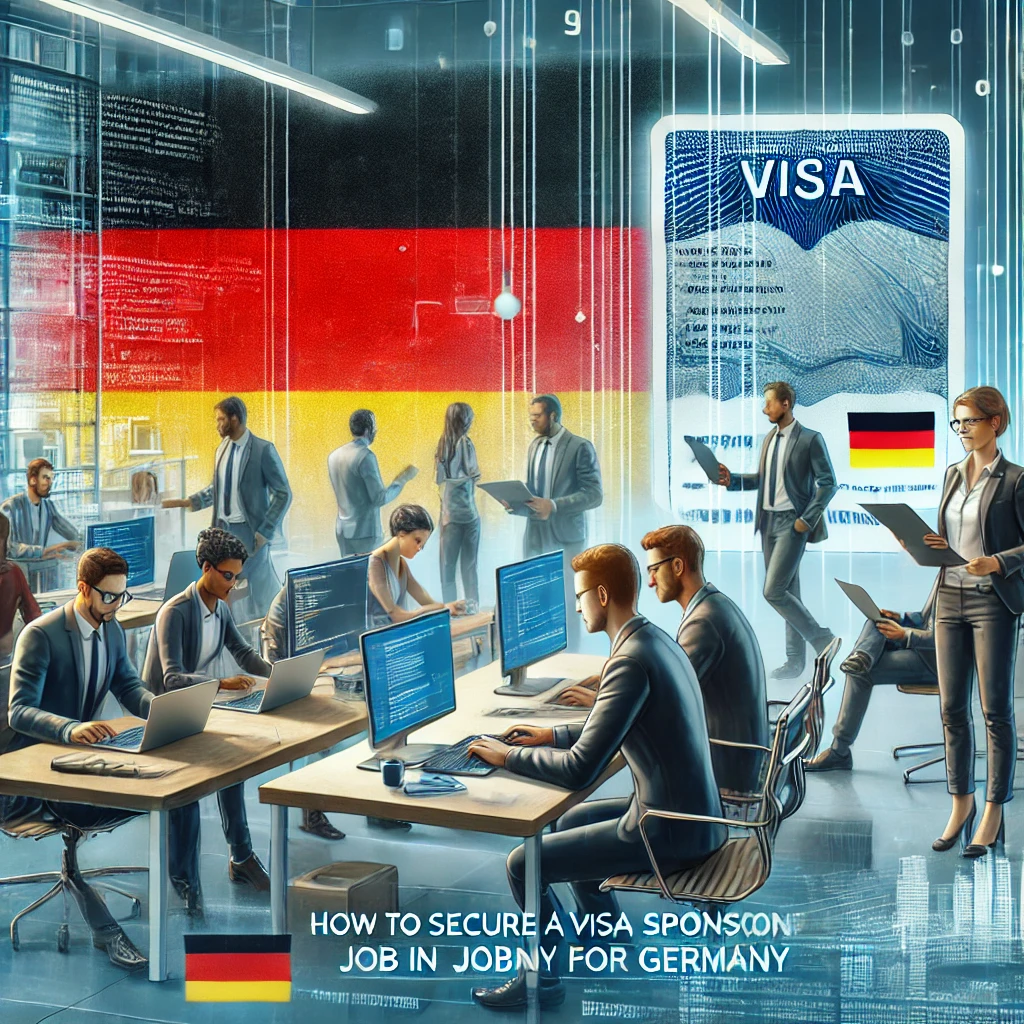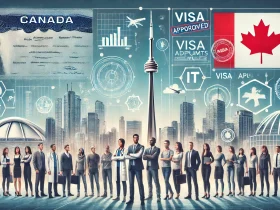Germany is one of the top destinations for IT professionals due to its strong economy, thriving tech industry, and numerous career opportunities. As one of the largest tech hubs in Europe, the demand for skilled IT workers in Germany is high, with companies often offering visa sponsorships for qualified international candidates. If you are an IT professional looking to secure a job in Germany with visa sponsorship, follow the steps outlined below.
1. Understand the German IT Job Market
Before applying for jobs in Germany, it’s important to familiarize yourself with the country’s IT sector. Germany is home to several tech-heavy cities, including Berlin, Munich, Hamburg, and Frankfurt, where many multinational corporations, startups, and research institutions are based. The most in-demand IT roles in Germany typically include:
- Software Developers (Java, Python, C++)
- Data Scientists and Analysts
- Cybersecurity Experts
- DevOps Engineers
- IT Project Managers
- AI and Machine Learning Specialists
- Cloud Computing Experts
Germany’s tech industry values not only technical skills but also experience in working with cutting-edge technologies like artificial intelligence, blockchain, and cloud infrastructure.
2. Check Visa Requirements for Non-EU Citizens
As a non-EU citizen, you will need a work visa to live and work in Germany. The most common visa type for IT professionals is the EU Blue Card. The Blue Card allows highly qualified workers to work in Germany, provided they have an employment offer that meets certain conditions.
Requirements for the EU Blue Card:
- A recognized university degree or equivalent qualification in IT
- A job offer from a German company with an annual gross salary of at least €58,400 (as of 2024) or €45,552 for shortage occupations (IT falls under shortage occupations)
- Proof of health insurance and accommodation in Germany
Other visa options include the Work Visa for Qualified Professionals and the Job Seeker Visa (which allows you to enter Germany and look for a job on-site).
3. Enhance Your Skills and Qualifications
To increase your chances of securing a job with visa sponsorship in Germany, it is essential to ensure that your IT skills align with what employers are looking for. Some ways to do this include:
- Certifications: Obtaining certifications in cloud computing (AWS, Microsoft Azure), cybersecurity, or software development can make you stand out. Popular certifications such as Certified Information Systems Security Professional (CISSP), AWS Certified Solutions Architect, or Microsoft Azure Administrator are highly valued in Germany.
- Language Skills: While many IT jobs in Germany are offered in English, learning German can significantly enhance your prospects. It may not be mandatory for every job, but having a basic command of the language (B1 level or higher) can improve your chances of landing a role and integrating into the local culture.
4. Prepare a German-Style CV and Cover Letter
German employers tend to prefer a specific format when it comes to CVs (Lebenslauf) and cover letters. Tailoring your application to fit these expectations will make a positive impression and increase your chances of being considered for a role.
Key Tips for a German-Style CV:
- The CV should be no longer than two pages and should include personal details (name, contact information), a professional photo, and your work history in reverse chronological order.
- Include sections for Education, Work Experience, Technical Skills, Certifications, and Languages.
- Focus on measurable achievements in your previous roles, and make sure to highlight skills and technologies relevant to the job you are applying for.
Cover Letter:
- Your cover letter should be concise, well-structured, and personalized to the specific job.
- Start with a formal greeting, express your motivation for applying, and highlight your most relevant skills and experiences.
- Be sure to mention your willingness to relocate to Germany and whether you require visa sponsorship.
5. Use German Job Portals and Recruitment Agencies
There are several job portals and recruitment agencies in Germany that specialize in hiring IT professionals. Some of the most popular platforms where you can find IT jobs with visa sponsorship include:
- LinkedIn: A global platform with numerous German companies posting jobs.
- Xing: A professional network widely used in Germany, similar to LinkedIn.
- StepStone: One of Germany’s largest job portals, with many opportunities for international candidates.
- BerlinStartupJobs: Ideal for finding IT roles in the startup scene, especially in Berlin.
- Stack Overflow Jobs: Offers tech-specific job listings, many of which are based in Germany.
Additionally, working with a recruitment agency can help streamline the process. Agencies like Robert Half, Hays, and Experis often assist international candidates with visa sponsorship placements in the IT sector.
6. Network with IT Professionals in Germany
Building a network within the IT community in Germany is crucial. Attending online and in-person events such as tech meetups, industry conferences, and webinars can help you connect with employers and fellow professionals. Some popular tech events in Germany include:
- Bits & Pretzels: A startup and innovation festival held in Munich.
- Berlin Tech Job Fair: A career event specifically for tech professionals.
- CeBIT: A prominent technology fair showcasing innovations in IT, AI, and cybersecurity.
Online communities such as LinkedIn Groups, Xing Groups, and tech-specific forums like GitHub and Stack Overflow can also be beneficial for networking.
7. Apply for Jobs That Offer Visa Sponsorship
When applying for jobs, specifically look for positions that mention visa sponsorship for international candidates. Many German companies, especially in the tech sector, indicate whether they are open to sponsoring visas. In your application, it’s a good idea to explicitly mention your visa situation and willingness to relocate.
8. Be Prepared for Interviews
Once you secure an interview, it is essential to be well-prepared. German employers value punctuality, professionalism, and clarity in communication. Here are a few tips for your interview preparation:
- Research the Company: Understand the company’s products, services, and culture. Tailor your responses to show how your skills align with their needs.
- Showcase Technical Proficiency: Expect to be tested on your technical skills. This could include live coding challenges or problem-solving tasks.
- Discuss Your Relocation Plan: Be ready to discuss how you will handle moving to Germany and integrating into their work culture.
Make sure to follow up with a thank-you email after the interview, expressing your continued interest in the role.
9. Work with an Immigration Lawyer (Optional)
If you’re unfamiliar with the visa process, consider consulting an immigration lawyer who specializes in German work visas. While not mandatory, working with a legal expert can ensure that all your documents are in order and that the visa application process goes smoothly.
10. Leverage the German Jobseeker Visa (Alternative Pathway)
If you haven’t secured a job yet, you can apply for a Jobseeker Visa, which allows you to live in Germany for up to six months while searching for employment. This visa gives you the flexibility to network, attend interviews, and get a feel for the German work environment before securing a job.
Conclusion
Securing a visa sponsorship job in Germany as an IT professional requires a well-planned strategy, from researching the job market to ensuring your skills meet employer expectations. By enhancing your qualifications, tailoring your application materials, and utilizing German job portals and recruitment agencies, you can significantly improve your chances of landing a sponsored IT role in one of Europe’s most dynamic tech hubs.







Leave a Reply